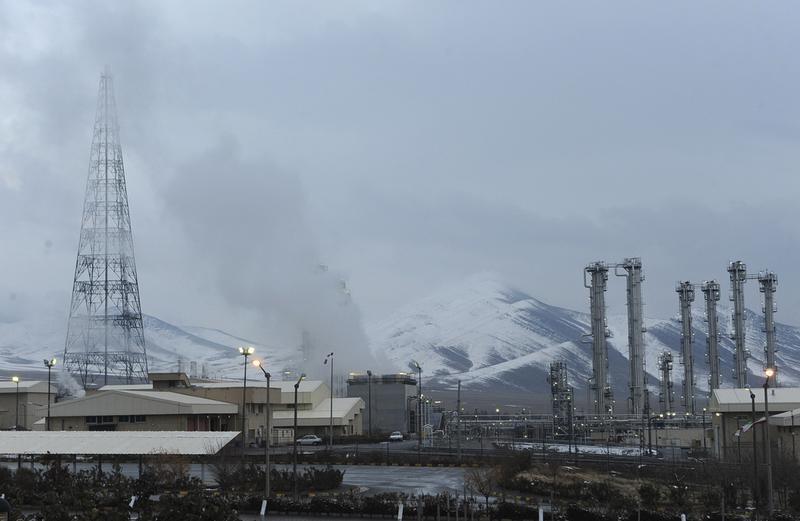Iran nuclear deal: More pressure on Tehran as Europeans lose patience
https://arab.news/gp263

In a development that was expected by many but that perhaps surprised Iran, the three European signatories to the Joint Comprehensive Plan of Action (JCPOA) — France, Germany and the UK — on Friday released a statement on Iran’s violations of the nuclear deal. The statement also touched on Iran’s obstruction of International Atomic Energy Agency (IAEA) inspectors from visiting Iran and inspecting sites. In the aftermath of this statement, the US emphasized its commitment to stopping Iran from acquiring nuclear weapons.
The three countries, known as the E3, announced a tough stance on Iran’s breaches of the nuclear deal. The IAEA also criticized Iran over its nuclear program on Friday. Its board of governors passed a resolution officially calling on Tehran to allow inspectors to visit two sites where past nuclear activity may have occurred. This resolution is considered as the first step taken by the UN-affiliated agency against Iran’s nuclear program since 2012.
The resolution, submitted by the same three European countries but opposed by China and Russia, stipulated that the IAEA’s board of governors calls on Iran to fully cooperate with the agency and meet its demands without any delay. This includes permitting immediate access to the two sites the agency has been trying to inspect. For his part, Iran’s representative to the IAEA condemned the resolution, asserting that Tehran would take appropriate measures in response. He added that those who proposed the resolution would bear the consequences, but he stopped short of detailing the steps Tehran could take.
The trilateral UK-Germany-France statement, which was released after the IAEA’s resolution, contained two key messages. The first emphasized the ongoing commitment of the three European countries to the nuclear deal and their belief that the US’ withdrawal from the JCPOA and its subsequent maximum pressure policy have been unconstructive and do not have their support.
The three European countries believe there should be a different and more effective policy. However, they did not detail what this policy should be and offered no clear strategy on this matter. The European statement also sent a firm message to Washington that it should back down from its plan to refer the Iranian nuclear file to the UN Security Council. The US is eager for UN sanctions that were lifted under the terms of the JCPOA to be reimposed on Iran.
The second message touched on the E3’s support for the efforts made by Washington to prevent an arms embargo, which is due to expire in October, from being lifted. This message means that the three European countries believe Iran’s behavior undermines security and stability in the region.
The five steps taken by Iran in response to the US’ withdrawal from the nuclear deal highlight a lack of trust in Tehran’s intentions and nuclear policies. They have also exposed Iran’s long-standing claims that its nuclear program is for peaceful purposes. This message indicates that the three European countries have shifted closer to the US policy on Iran than ever before.
This may lead the Europeans to soon take further steps, such as imposing sanctions on Iran, while reiterating their support for the nuclear deal. It also cannot be ruled out that the three European countries will suspend the INSTEX financial mechanism for conducting trade dealings with Iran — without using the US dollar — which entered into force last year.
This message indicates that the three European countries have shifted closer to the US policy on Iran than ever before.
Dr. Mohammed Al-Sulami
If Iran does not cooperate with the IAEA in the coming few months, it is likely that the E3 will freeze the JCPOA without pulling out of it entirely. This move would aim to put more pressure on Iran. The Europeans may also seek to negotiate with Moscow and Beijing to encourage them to take similar steps, but it is unlikely they will respond positively given the current circumstances. Regional countries such as Saudi Arabia, the UAE and Bahrain may increase their diplomatic engagement with Russia and China in a bid to reach an agreed position on Iran. These countries want to send a message to Tehran that Russia’s and China’s support for its position is not unconditional. The Iranians should take steps on the ground to ensure that these countries support it.
The coming few months are crucial in regard to Iran’s nuclear file and much is also dependent on Tehran’s reaction, as it could threaten to increase its level of uranium enrichment, increase the number of centrifuges or, perhaps, work to fully reopen the Arak heavy water nuclear facility.
- Dr. Mohammed Al-Sulami is Head of the International Institute for Iranian Studies (Rasanah). Twitter: @mohalsulami









































